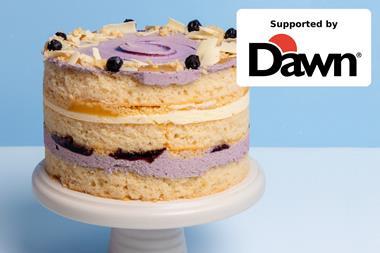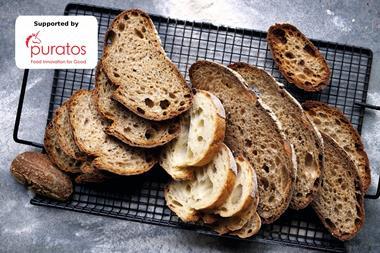Buying in ready-made pastry or pastry cases can have big benefits – and doesn’t need to hamper creativity
In a perfect world, every pastry product would be handmade from scratch, using traditional methods, local ingredients and a good chunk of time.
The latter, in particular, is in short supply for food businesses, which is why many opt to buy in ready-made pastry and pastry cases. It’s a strategy that can have many benefits for a business, beyond time-saving.
“Using bought-in products allows staff of any skill level to prepare pies or pastries, as the products are extremely easy to use,” says Nicola Emmerson, marketing activation manager at CSM Bakery Solutions.
And a product can still have an artisan look and feel when produced using ready-to-fill pastry. Fabien Levet, commercial manager at Pidy UK, says that, once filled and finished in the oven, consumers would never guess Pidy cases were not handmade.
“Each has been carefully crafted to produce the taste and texture of homemade, but with the stability and consistency demanded by the professional kitchen,” he explains.
As well as potential time and labour savings, using bought-in pastry means a business does not have to invest in expensive equipment that must be maintained and repaired, explains Ronnie Miles, managing director at Bells Food Group.
Since September 2017, Scottish firm Bells has been operating a separate division, called Bells Professional Pastry, to supply pastry to food manufacturers wholesalers, bakeries and butchers. The move followed a £3.6m investment to double Bells’ pastry production capacity to 150 tonnes a week.
“We use only the finest ingredients through a continuous mixing and pastry laminating process system to manufacture consistent quality products,” says Miles.
He adds that buying in pastry can be effective for businesses of any size, although the formats required will differ.
“Larger manufacturers with semi-automated pastry sheeting and rolling equipment can cost-effectively use bought-in large puff pastry slabs as this can be used on line without the manufacturer having to weigh, mix and laminate pastry ingredients saving labour costs, as well as valuable manufacturing time,” says Miles.
“Smaller manufacturers could use bought-in pastry that is pre-rolled and in a pre-cut shape format, as this is a lot more convenient for businesses that may not have the production space, equipment or expertise to manufacture pastry.”
Levet at Pidy says offering a wide range of products helps his customers keep up with current trends. “We have a specifically developed organic range that is made
from pure butter and red cane sugar, along with a wholemeal and gluten-free pastry to ensure bakers can source specialist products when required.”
Miles at Bells points out that, although his business does not offer a gluten-free range, using pre-cut pastry can help businesses control and separate their gluten and non-gluten products. “This can limit the amount of equipment needed to process gluten and non-gluten products, helping manufacturers with storage, handling, PPE and wash-down elements,” he adds.
Pastry suppliers insist there is no reason why using bought-in pastry should hamper a chef’s or baker’s creativity.
“By having a quality base product, such as quiche cases and sweet tartlets, bakers can have the freedom and creativity to add their own details and create bespoke products that suit their menu,” says Levet.
It’s a view echoed by Jacqui Passmore, Dawn Foods marketing manager for UK and Ireland, who says: “Using a good-quality ready-made pastry case, for example, means bakers can spend more time getting creative with filling and finishing the final product.”
CASE STUDY: High-end catering with bought-in pastry
Patisserie expert Claire Clark runs event catering business Pretty Sweet in London’s Park Royal with fellow pastry chef Sarah Crouchman.
The business supplies cake and patisserie for events including Wimbledon, Ascot and Goodwood, plus five-star hotels, Michelin-star restaurants and department stores such as Selfridges and Fortnum & Mason.
“Sarah and I started Pretty Sweet three years ago when we saw a gap in the market for high-end production rather than mediocre and more basic patisserie,” explains Clark. “A lot of our work is very detailed, such as creating handmade decorations and intricate designs, requiring craft-skilled workers.”
As with many chefs, the Pretty Sweet team don’t have time to make pastry from scratch when producing such large quantities, and find buying in ready-made items to be cost effective.
“We have times in the year, particularly in the summer, where we need to produce 70,000 tart shells and because we are a small team of craftsmen, we just don’t have the capacity to provide that.
“By using a high-quality, reliable product as a base, we are able to add our own elements of taste and flavours to highlight the product and transform it into something amazing.”
Clark uses a range of Pidy products in her work, particularly the brand’s telline, Trendy Shells and small individual tarts in various shapes and flavours.
“We have been using the speciality flavoured tarts a lot recently and these add an extra dimension to the finished product,” she explains. “They are versatile and bring a lovely assortment of shapes and colours to an afternoon tea selection.”
Pretty Sweet creations include mini treats made using pistachio tarts with a chocolate orange compote and passion fruit curd.
Clark adds that Pidy products travel well: “This is always important for us to consider because we can ensure they do not get broken during transit.”
She also praises the supplier’s customer service and support, including sending out regular samples of new products.
“We are very strong on development here and this means we quite often have to work three to six months ahead, so having the new products as soon as they come out allows us to spend time developing them and then roll them out to our customers.”


























No comments yet